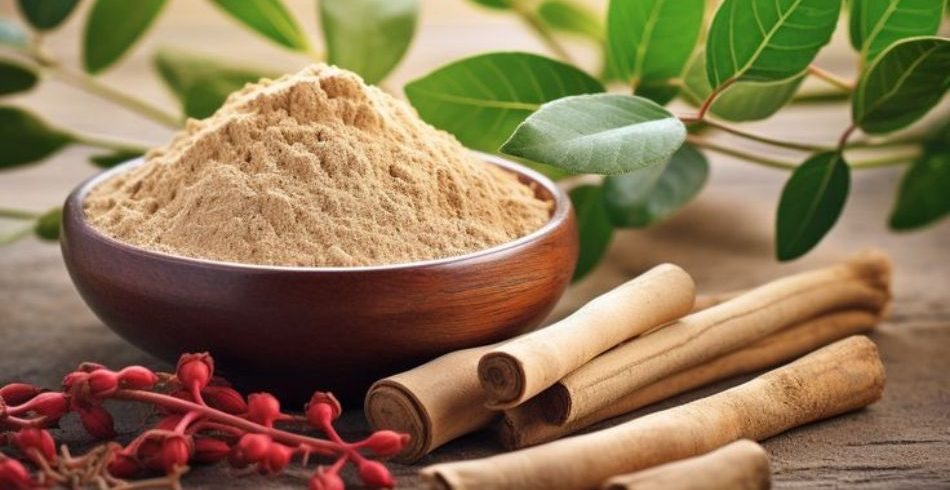
Millions grapple with stress, a natural part of life. Yet, when stress becomes chronic, it morphs into a silent saboteur.
The research paints a bleak picture: prolonged stress can pave the way for depression, headaches, weight gain, and even serious conditions like heart disease, high blood pressure, dementia and stroke. Sleep, too, often becomes a casualty.
The American Institute of Stress adds another layer of concern, linking stress to a heightened risk of type 2 diabetes and a weakened immune system. It’s a sobering reality that’s driving many to seek natural solutions for stress relief and overall well-being.
Ashwagandha, an ancient herb with a modern resurgence, could be the answer (at least) to some of these issues. Rooted in thousands of years of traditional use in Ayurvedic medicine, this unassuming shrub is now backed by an impressive body of scientific research, revealing its potential to not only alleviate stress and anxiety but also promote a wide range of health benefits.
An Ancient Root with Modern Relevance
Ashwagandha (Withania somnifera), often referred to as “Indian Ginseng” or “Winter Cherry,” has been a key component of Ayurvedic medicine for over 3,000 years. Revered as a “Rasayana” – a substance that promotes youthfulness and longevity – it was traditionally used to address a wide array of conditions, including stress, anxiety, fatigue, cognitive decline, and immune weakness. In recent years, modern science has caught up with this ancient wisdom, and has garnered significant attention for its potential to improve both mental and physical health.
The Science Behind Ashwagandha’s Stress-Busting Power
Ashwagandha is classified as an adaptogen, a unique category of herbs that help the body adapt to stress and maintain balance. But how does it actually work? The answer lies in its complex interaction with the body’s stress response system.
What the research says:
- Reduce Cortisol Levels: Cortisol, the body’s primary stress hormone, can wreak havoc on our health when levels are chronically elevated. Research shows that Ashwagandha can significantly lower cortisol levels.. A study in 2023 found reduction in serum cortisol levels between 11% and 32.6% in adults with chronic stress.
- Modulate Neurotransmitters: Ashwagandha interacts with key neurotransmitters in the brain, including GABA and serotonin. GABA, an inhibitory neurotransmitter, promotes relaxation and reduces anxiety, while serotonin plays a vital role in mood regulation. By modulating these neurotransmitters, Ashwagandha helps create a sense of calm and well-being.
- Combat Oxidative Stress: Ashwagandha possesses potent antioxidant properties, protecting cells from damage caused by free radicals. This oxidative stress is a major contributor to aging and various diseases. By neutralizing free radicals, Ashwagandha may help slow down the aging process and support overall health.
Experts agree on the stress-relieving benefits of ashwagandha. Dr. Brenda Powell, co-medical director at the Cleveland Clinic’s Wellness Institute, emphasizes that “adaptogens help your body handle stress,” recommending ashwagandha for chronic stress and hormonal imbalances. Dr. David C. Leopold, network medical director at Hackensack Meridian Health, adds that this herb, classified as an adaptogen due to its positive effects on the immune system, contains withanolides, substances believed to be responsible for its stress-reducing and fatigue-fighting properties.
Ashwagandha’s Broader Health Benefits
Beyond its stress-relieving properties, it offers a myriad of other potential health benefits, supported by emerging research:
- Improved Sleep: Ashwagandha has shown promise in improving sleep quality and reducing insomnia. Its calming effects can help promote relaxation and prepare the body for restful sleep.
- Enhanced Cognitive Function: Studies suggest that it may improve memory, focus, and cognitive performance.
- Neuroprotection: Emerging research indicates that Ashwagandha’s antioxidant and anti-inflammatory properties may offer neuroprotection, helping to safeguard the brain against damage and degeneration.
- Athletic Performance and Recovery: Ashwagandha has been shown to enhance athletic performance, increase muscle mass, and improve recovery time in some studies. However, more research is needed to confirm these effects.
Incorporating Ashwagandha into Your Daily Life
If you’re intrigued by it’s potential, here’s what you need to know about incorporating it into your wellness routine:
- Dosage and Forms: The recommended dosage of Ashwagandha can vary depending on the specific product and individual needs. Typical dosages range from 300mg to 600mg per day, often divided into two doses. It’s available in various forms, including capsules, powders, and extracts. Choose a reputable brand that provides third-party testing for purity and potency.
- Timing: Ashwagandha can be taken at any time of day, but some people prefer to take it in the morning or afternoon to avoid potential sleep disruptions.
- Choosing a Supplement: Look for standardized extracts, as they offer a consistent amount of active compounds. Two popular standardized extracts are KSM-66 or powder form.
- Precautions: Ashwagandha is generally safe for most people, but it can interact with certain medications, such as thyroid medications and immunosuppressants. It’s essential to consult with your healthcare provider before starting any new supplement, especially if you have underlying health conditions or take medications.
Ashwagandha vs. Other Adaptogens: How Does It Compare?
While Ashwagandha is a star player in the world of adaptogens, it’s not the only option. Other popular adaptogens include:
- Rhodiola Rosea: Known for its energy-boosting and anti-fatigue effects, Rhodiola is often used to improve mental and physical performance.
- Holy Basil (Tulsi): Revered in Ayurveda for its calming and stress-reducing properties, Holy Basil is also believed to support immune function and promote longevity.
- Reishi mushroom (Lingzi): Extensively used in Traditional Chinese Medicine, this fungus have adaptogenic, anti-cancer, immunomodulating and anti-oxidant properties
While each adaptogen has its unique benefits, Ashwagandha stands out for its well-rounded effects on stress, anxiety, sleep, cognitive function, and overall well-being, which has been extensively researched and also vetted by 3000 years of traditional use. However, the best choice for you will depend on your individual needs, availability and preferences.
Conclusion: Embrace Ashwagandha’s Ancient Wisdom for Modern Wellness
Ashwagandha, with its rich history and robust scientific backing, offers a natural and effective way to combat stress, anxiety, and promote overall health and longevity. Whether you’re looking to improve sleep, sharpen your mind, or simply feel more balanced and resilient in the face of life’s challenges, this ancient herb may hold the key to unlocking your full potential.
Those seeking a natural path to wellness, Ashwagandha may be a powerful ally in the pursuit of a healthier, happier, and more vibrant life.




